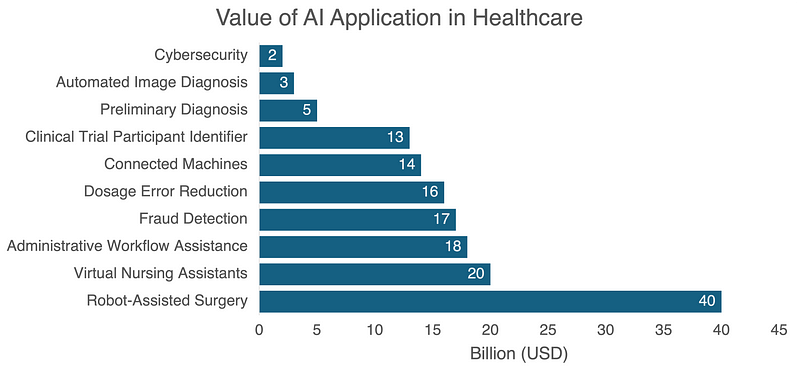The future of healthcare is at a crossroads, and AI stands at the center of this pivotal moment. No one can argue against the impact AI will have on healthcare. It’s helping doctors diagnose diseases, manage patient care, and use medical resources more effectively.
But who should control this powerful tool?
With the current polarization of American politics, the debate will only intensify, leading to a messy political showdown. As with any issue, once it has become politicized, who will be most impacted, or rather, who ends up being the innocent bystander?
Answer: The people.
Over the past few years, I’ve seen genuinely remarkable advances in AI for healthcare and biotech research. I assure you that the clinicians, nurses, and medical researchers I’ve worked with are not thinking about politics.
They’re thinking about how they can do better for their patients.
The Real Impact of AI in Healthcare
The role of AI in healthcare and biotech research isn’t just about the latest advances of how an algorithm can detect some disease from an image scan or fast-track new drug development. Yes, these are breakthrough milestones in medicine, but there’s so much more.
Let’s start with the economic impact, specifically how much can AI help reduce the economic burden. The U.S. healthcare system is notoriously complex and fragmented. This complexity leads to inefficiencies and high costs.
AI can help bring down healthcare costs in several ways. Automating tasks like scheduling patient appointments and handling billing can reduce operational expenses. AI can also identify patients at high risk of complications, ensuring they get the necessary follow-up care and reducing hospital readmissions. Several studies have estimated that AI could save the U.S. healthcare system up to $360 billion a year.
From the chart below, the three applications of AI that are expected to provide the most economic relief in the near future are robot-assisted surgery, worth $40 billion; virtual nursing assistants, valued at $20 billion; and administrative workflow assistance, estimated at $18 billion.

Figure by author. Data from Accenture.
Without a doubt, AI will eventually democratize healthcare.
Until then, it’s estimated that 18% of Americans have medical debt that has been sent to collection agencies. Many families face financial ruin from simple medical procedures due to high costs. AI can help lower costs, making healthcare more affordable and accessible for everyone.
Healthcare should be a right, not a privilege.
The real impact of AI in healthcare goes beyond technological optimism. As basic healthcare becomes increasingly unaffordable, people will demand solutions.
This public outcry will force governments to intervene, accelerating the adoption of AI to alleviate the pressure. However, how AI is implemented will inevitably become a political debate, potentially leaving those who need help the most forgotten amidst the bureaucracy.
Fragmented Regulatory Landscape
One of the main challenges in regulating AI in healthcare is the inconsistent and fragmented set of rules. The United States lacks a single, comprehensive standard specifically for AI in healthcare. Instead, various federal agencies and state-level regulations govern different aspects of AI use. This creates a complex and sometimes overlapping regulatory landscape.
For example, the Food and Drug Administration (FDA) oversees AI and machine learning-based software as medical devices, classifying them by risk and requiring thorough pre-market testing.
Health Insurance Portability and Accountability Act (HIPAA) mandates that AI developers comply with standards for patient data privacy, including encryption and breach notifications.
The Centers for Medicare & Medicaid Services (CMS) evaluates the effectiveness of new AI technologies for Medicare and Medicaid coverage.
Meanwhile, the Federal Trade Commission (FTC) ensures that claims about AI health products are truthful and enforces data breach and consumer privacy laws.
Executive Order 14110 — A step in the right direction

President Joe Biden drops by a meeting with Vice President Kamala Harris and AI CEO’s, Thursday, May 4, 2023, in the Roosevelt Room of the White House. (Official White House Photo by Adam Schultz).
President Joe Biden signed the Executive Order on Safe, Secure, and Trustworthy Development and Use of Artificial Intelligence (Executive Order 14110) on October 30, 2023. This order aims to create a national approach to governing AI and is the most comprehensive AI governance effort by the U.S. to date.
While this represents a significant step toward a more unified approach to AI governance, it is NOT a unified policy for regulating AI in healthcare.
Instead, it sets broad policy goals and directives that apply across various sectors, including healthcare. The order aims to promote a cohesive national strategy but doesn’t replace the existing fragmented regulatory framework involving multiple agencies like the FDA, HIPAA, CMS, and FTC.
The Looming Political Battle
Even with the progress made by Executive Order 14110, it’s clear that more needs to be done. As AI continues to advance in healthcare, there will be a growing demand for a harmonized approach to its implementation.
This is where Democrats and Republicans differ.
Democrats usually support strict regulations and government oversight to ensure safety and fairness, while Republicans often prefer less government interference and more market-driven approaches.
This fundamental disagreement is setting the stage for a contentious political debate about the future of AI in healthcare.
Democrats’ push for ethical AI use in healthcare
Democrats are advocating for strong regulations to ensure the ethical use of AI in healthcare. They argue that without strict rules, AI could compromise patient privacy, increase biases, and widen healthcare disparities.
Senator Elizabeth Warren and other Democrats have called for Medicare to take more aggressive action to prevent the misuse of AI in denying care to patients.
They emphasize the need to protect patients from potential harms, such as the unlawful denial of medical services, and to ensure AI-driven claims in Medicare Advantage plans do not restrict access to care.
Democratic-sponsored bills focus on ensuring that these AI systems do not perpetuate biases or inequalities in healthcare. A study published in Science shows commercial algorithms recommended less healthcare for Black patients due to its reliance on historical cost data.
“Nobody’s watching. No guardrails. No guardrails to protect the patients from flawed algorithms and AI systems.”
“Nobody’s watching. No guardrails. No guardrails to protect the patients from flawed algorithms and AI systems.”
As a result, Democrats support measures like the “Algorithmic Accountability Act,” which would require companies to assess and mitigate biases in their AI systems.
Overall, Democrats stress the importance of transparency in AI implementation. They believe AI algorithms should be explainable, with clear accountability for decisions made by AI. They support initiatives to increase transparency in AI tools, ensuring patients and healthcare providers understand how AI-driven decisions are made.
Republicans advocate for AI innovation with sensible regulation
Republicans have a different perspective on AI in healthcare. They stress the importance of innovation and competition, arguing that too much regulation could stifle technological progress and push businesses overseas.
Their focus is on establishing a balanced regulatory environment that encourages growth while addressing important privacy and ethical concerns.
Senator Mike Crapo and other Republicans have emphasized the need for a balanced approach, urging not to rush into legislation without considering its potential impact on innovation.
“One-size-fits-all, overly rigid, and unduly bureaucratic laws and regulations risk stifling life-saving advances and becoming outdated before they are even codified.”
Republican-sponsored bills often prioritize data privacy rights and national security concerns. Executive Order 13859, issued in February 2019 by former president Donald Trump, aims to maintain and enhance American leadership in AI. This order establishes the American AI Initiative, which seeks to promote and protect national interests through strategic investments.
They warn that over-regulation could push AI businesses to countries like China, causing the U.S. to fall behind in the global AI race and face serious economic and security consequences.

President Trump signs the Executive Order on “Maintaining American Leadership in Artificial Intelligence”. (Official White House Photo by Joyce N. Boghosian)
Despite their reluctance to regulate AI, some Republicans are more skeptical about the technology itself. They believe AI could negatively impact working-class people, showing concern that AI might lead to job losses, wage suppression, or other adverse economic effects on workers.
Republicans believe Medicare coverage and payment policies should keep pace with emerging AI-enabled technologies to foster innovation.
Overall, Republicans insist on innovation, competition, and balanced regulation for AI in healthcare. They aim to foster technological advancements and economic growth while ensuring these benefits reach all patients without compromising privacy and ethics.
Rare Bipartisan Support Among Voters
A survey of 3,610 registered voters by the Program for Public Consultation reveals that 76% of Republicans and 88% of Democrats support AI regulation in healthcare. This broad alignment among voters suggests that despite the political divide, there is common ground on ensuring AI is used safely and effectively.
But what does this mean for the future?
This convergence offers a unique opportunity. Bipartisan support could drive meaningful policy changes. The challenge is turning this consensus into action.
Policymakers must rise above partisan politics and create a regulatory framework that balances innovation with safeguards, ensuring AI serves everyone equitably.
Voters’ alignment indicates a deeper insight: the collective recognition of AI’s potential and its risks.
The power to shape the future of AI in healthcare isn’t just in the hands of politicians; it’s in all of ours. What will we ask from our leaders to ensure AI benefits everyone? The answer to that could define the next chapter in healthcare.
If you liked the article, subscribe for more AI in Healthcare and Biotech News!



